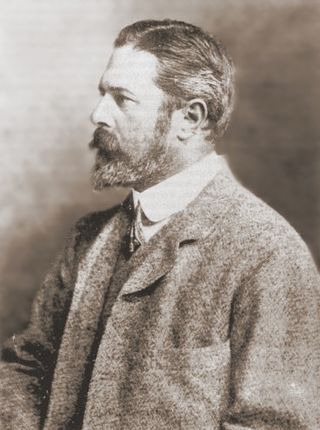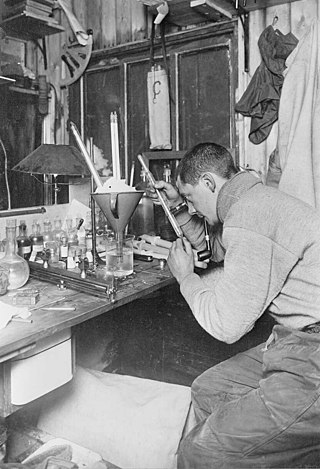
The Cavendish Laboratory is the Department of Physics at the University of Cambridge, and is part of the School of Physical Sciences. The laboratory was opened in 1874 on the New Museums Site as a laboratory for experimental physics and is named after the British chemist and physicist Henry Cavendish. The laboratory has had a huge influence on research in the disciplines of physics and biology.

Sir Alan Lloyd Hodgkin was an English physiologist and biophysicist who shared the 1963 Nobel Prize in Physiology or Medicine with Andrew Huxley and John Eccles.

Sir Edwin Ray Lankester was a British zoologist.

John Zachary Young FRS, generally known as "JZ" or "JZY", was an English zoologist and neurophysiologist, described as "one of the most influential biologists of the 20th century".

Ernest William Lyons Holt or E. W. L. Holt was an English marine naturalist and biologist who specialized in ichthyology, the study of fish. His work helped lay a scientific foundation for the fishery management in Ireland, and together with William Spotswood Green, he strongly influenced the development of the Irish Fisheries in its early years.
The Centre for Environment, Fisheries and Aquaculture Science (Cefas) is an executive agency of the United Kingdom government Department for Environment, Food and Rural Affairs (Defra). It carries out a wide range of research, advisory, consultancy, monitoring and training activities for a large number of customers around the world.
Sir Frederick Stratten Russell was an English marine biologist.
Hildebrand Wolfe Harvey CBE FRS was an English marine biologist.

Walter Garstang FLS FZS, a Fellow of Lincoln College, Oxford and Professor of Zoology at the University of Leeds, was one of the first to study the functional biology of marine invertebrate larvae. His best known works on marine larvae were his poems published as Larval Forms and Other Zoological Verses, especially The Ballad of the Veliger. They describe the form and function of several marine larvae as well as illustrating some controversies in evolutionary biology of the time.

Edward William Nelson (1883–1923) was a British marine biologist and polar explorer. Educated at Clifton College, Tonbridge School and Cambridge University, he was independently wealthy. He worked at the Marine Biological Association of the United Kingdom (MBA) in Plymouth and was member of the 1910–1913 British Antarctic Expedition. In association with E. J. Allen, he developed a simple method for culturing phytoplankton.
The School of Biological Sciences is a research-led academic community at the University of East Anglia. It works with partners in industry on a range of activities, including translating research discoveries into products, making knowledge and research expertise available through consultancies, contract research and provision of analytical services, as well as partnering industry in training both undergraduate and postgraduate students.

David William Sims is a British marine biologist known for using satellite tracking to study wild behaviour of sharks and for the Global Shark Movement Project. He is Senior Research Fellow at the Laboratory of the Marine Biological Association (MBA) in Plymouth, and a Professor of Marine Ecology in the National Oceanography Centre, Southampton at the University of Southampton, U.K.
Mary Winifred Parke, FRS, was a British marine botanist and Fellow of the Royal Society (1972) specialising in phycology, the study of algae.
Sir John Archibald Browne Gray, was a British physiologist who served as secretary of the Medical Research Council (MRC) from 1968 to 1977.
John Dow Fisher Gilchrist (1866–1926) was a Scottish ichthyologist, who established ichthyology as a scientific discipline in South Africa. He was instrumental in the development of marine biology in South Africa and of a scientifically based local fishing industry.

Rosa Mabel Lee (1884-1976) was a British statistician, the first woman scientist to be employed by the Marine Biological Association and the first woman to work as a government fishery scientist in the United Kingdom.

Marie Victoire Lebour was a British marine biologist known for her study of the life cycles of various marine animals. She published more than 175 works during her long career.

RV Huxley was the first research vessel used by the Marine Biological Association of the United Kingdom explicitly for fisheries research and is regarded as the first vessel yielding data for the Ministry of Agriculture, Fisheries and Food - Directorate of Fisheries, now known as the Centre for Environment, Fisheries and Aquaculture Science (Cefas).
Ebenezer Ford OBE FRSE ARCS DIC was a British marine zoologist. He was generally known as Ebb Ford. He was a competent artist and created several thousand "specimen drawings". From 1924 to 1929 he conducted a major study of the British herring shoals. He was a strong supporter of the Sea-Fishing Industry Act of 1933.
Arthur Thomas Masterman FRS FRSE was an English zoologist and author. He was an expert on the British fishing industry.












